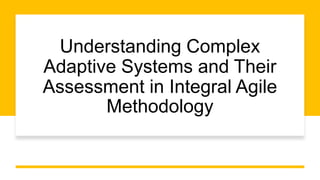Understanding Complex Adaptive Systems and Integral.pptx
•Download as PPTX, PDF•
0 likes•2 views
Apply the Integral Agile methodology so your organization can effectively assess the maturity of its complex adaptive system. This should support teams in their efforts to implement strategies and enhance their ability to navigate and thrive in complex, ever-changing environments.
Report
Share
Report
Share

Recommended
Recommended
More Related Content
Similar to Understanding Complex Adaptive Systems and Integral.pptx
Similar to Understanding Complex Adaptive Systems and Integral.pptx (20)
ITS 832Chapter 4Policy Making and Modeling in aComplex.docx

ITS 832Chapter 4Policy Making and Modeling in aComplex.docx
Different Perspective On Organizational Communication

Different Perspective On Organizational Communication
Chapter 6 Structuring for ImprovementObjectives .docx

Chapter 6 Structuring for ImprovementObjectives .docx
Aligica & Tarko - Institutional resilience and economic systems

Aligica & Tarko - Institutional resilience and economic systems
Recently uploaded
Recently uploaded (10)
Marketing Management 16 Global Edition by Philip Kotler test bank.docx

Marketing Management 16 Global Edition by Philip Kotler test bank.docx
Mastering Compassion: A Heavenly Perspective on Leadership

Mastering Compassion: A Heavenly Perspective on Leadership
TEST BANK for Operations Management, 14th Edition by William J. Stevenson,.pdf

TEST BANK for Operations Management, 14th Edition by William J. Stevenson,.pdf
DrupalCamp Atlanta 2022 - Effective Project Management

DrupalCamp Atlanta 2022 - Effective Project Management
W.H.Bender Quote 63 You Must Plan T.O.P Take-Out Packaging

W.H.Bender Quote 63 You Must Plan T.O.P Take-Out Packaging
Management 13th Edition by Richard L. Daft test bank.docx

Management 13th Edition by Richard L. Daft test bank.docx
Leading People - Harvard Manage Mentor Certificate

Leading People - Harvard Manage Mentor Certificate
🍑👄Vijay Nagar Esℂorts Serviℂe☎️9559995582🍑👄 ℂall Girl serviℂe in Indore☎️Vija...

🍑👄Vijay Nagar Esℂorts Serviℂe☎️9559995582🍑👄 ℂall Girl serviℂe in Indore☎️Vija...
Understanding Complex Adaptive Systems and Integral.pptx
- 1. Understanding Complex Adaptive Systems and Their Assessment in Integral Agile Methodology
- 2. What are Complex Adaptive Systems (CAS)? • CAS are characterized by their ability to self-organize, adapt, and evolve in response to changing environments. • They are composed of a network of interconnected agents, each with their own unique capabilities and behaviors. • CAS are found in a wide variety of systems, including natural systems (e.g., ant colonies, ecosystems), social systems (e.g., organizations, markets), and technological systems (e.g., the Internet).
- 3. Key Characteristics of Complex Adaptive Systems • Emergence: CAS exhibit emergent properties, which are characteristics that arise from the interactions of individual agents rather than being explicitly programmed or designed. • Self-Organization: CAS possess the ability to organize themselves without external direction, demonstrating adaptability and resilience in the face of uncertainty. • Non-Linearity: Cause-and-effect relationships in CAS are often non- linear and difficult to predict, making traditional planning and control methods less effective.
- 4. Integral Agile Methodology: Assessing CAS • Integral Agile methodology provides a comprehensive framework for assessing and managing CAS in Agile projects. • It encompasses four key aspects: • Individual Agility • Team Agility • Organizational Agility • Ecosystem Agility
- 5. Assessing CAS Maturity • Integral Agile methodology provides a structured approach to assessing the maturity of CAS in Agile projects. • This involves evaluating the organization's ability to demonstrate the following characteristics: • Transparency • Continuous Learning • Empowerment • Resilience • Sustainability
- 6. Conclusion • CAS are a fundamental aspect of the Agile world. • By understanding and applying Integral Agile methodology, organizations can effectively assess and manage CAS, leading to increased project success and organizational agility.
Editor's Notes
- In this presentation, we will explore the concept of complex adaptive systems (CAS) and how they relate to Agile practices. We will also discuss the Integral Agile methodology, which provides a framework for assessing and managing CAS in Agile projects.
- CAS are complex and dynamic systems that are difficult to predict or control. However, they also exhibit remarkable resilience and adaptability, making them well-suited for operating in uncertain environments.
- These characteristics make CAS fundamentally different from traditional systems, which are typically designed to be linear, predictable, and controllable.
- Integral Agile methodology recognizes that CAS are complex and dynamic, and that traditional approaches to project management are not well-suited for managing them. Instead, it emphasizes the need for flexibility, adaptability, and continuous learning.
- By assessing the organization's maturity against these criteria, we can identify areas for improvement and develop strategies to enhance the organization's ability to manage CAS effectively.
- As the Agile landscape continues to evolve, the importance of understanding and managing CAS will only grow. By embracing Integral Agile methodology, organizations can position themselves for success in the increasingly complex and dynamic world of Agile projects.